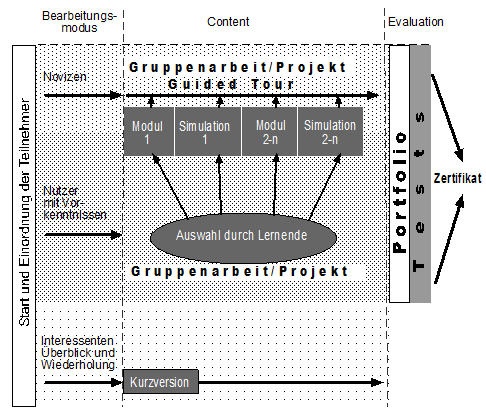Course
| Course title | "Psychological-didactic basics of e-learning" |
Course type | Seminar |
Degree course | Psychology, Education |
Lecturer | Prof. Dr. Ludwig Issing |
No. of participants | Supervised course: 30, unsupervised course: 90, English language course: 20 (per semester) |
SWS/CP | 2 SWS |
Tools
- Blackboard
- Interactive online learning modules for working on the contents
- Print version of the teaching contents
- Forum, chat, e-mail for communication
- Group areas for exchanging ideas
Realization
The learning environment: Concept
The course is modularized and designed in a hypermedial way so that the users that have prior knowledge can individually select and navigate to those modules that are of interest whereas beginners are led through the course using the concept of a systematic guided tour. Both variants focus on independent, self-paced learning.
The modules that orientate themselves on problem-based learning are set up according to the following design:
- Learning goal
- Introduction
- Contents
- Interactive tasks
Illsutration 1: Course design
Unsupervised online course
- The 12 learning modules are provided via the learning management system (LMS) Blackboard without tutor supervision or face-to-face sessions. As communication platform the students can use a forum. There were two face-to-face meetings: An introductory kick-off meeting and the exam day.
Supervised blended learning course
- The blended learning variant contains three face-to-face sessions:
- 1st meeting: Introduction to the course structure and Blackboard, implementation of an entrance test
- 2nd meeting (after module 6): Feedback and determining the group projects
- 3rd meeting (after module 9): Presentation of the developed projects
- The variant of the collaborative learning course contains the same learning modules as the self-learning course, which are, however, supplemented with group exercises and are supervised by two student tutors.
- The participants are divided into working groups of five students each. For every module each respective group has to post the results of the homework assigned to the forum within eight days; the other groups are asked to comment on this. The evaluation and the supplementation of the posts is undertaken in a final stage by the tutors.
Illustration 2: Portrayal of the theory of operatant conditioning by Skinner
Experiences made by the lecturer
The evaluation paints a positive picture when it came to assessing the structure Die Evaluation zeichnete ein positives Bild zur Bewertung der Struktur, Didakik, Verständlichkeit und Veranschaulichung des Online-Kurses. Der durchschnittliche Zeitaufwand je Modul wurde von den Studierenden mit drei Stunden eingeschätzt und der Gesamtaufwand für den Online-Kurs höher als üblicherweise für ein Präsenzseminar; die Module waren somit in der ersten Durchführung noch zu umfangreich. Im Verhältnis zum Lerngewinn wurde der Aufwand allerdings als gerechtfertigt beurteilt.
Bei der Umsetzung der Lehrveranstaltung in zweierlei Varianten zeigte sich, dass Betreuung und Kollaboration zentrale Faktoren eines Online-Lernarrangements sind, um am Ball zu bleiben. Die an dem tutoriell betreuten Kurs eingeschrieben Studierenden (30) beendeten nahezu alle das Seminar, wohingegen bei dem unbetreuten Kurs (90) nur ein Drittel an der Klausur teilnahm. Die Fähigkeit zum selbstorganisierten Lernen kann bei der Konzeption eines Online-Lernarrangements nicht per se als selbstverständlich angenommen werden, Angebote zur Betreuung/Peerarbeit sind daher zu empfehlen.
Support offered by CeDiS
- Consulting services for the implementation of digital solutions in teaching: The Center for Digital Systems (CeDiS) has extensive experience of many years when it comes to the implementation of digital media and systems within the fields of teaching, learning and research. We offer a wide variety of consulting services on the implementation of these tools and systems within the entire academic scope and especially at Freie Universität Berlin.
- Training courses and workshops: For lecturers at Freie Universität Berlin (professors, employees, tutors) as well as lecturers of other universities CeDiS offers training courses and workshops on the topic of teaching and learning with digital media. These course enable participants to implement online elements within their own sphere of teaching.
- The Executive Board of the Freie Universität supports e-learning initiatives: With the e-learning funding program financial resources are provided to lecturers that enrich and improve their courses quality-wise by implementing technological and media-related support. All of the academic staff teaching, the lecturers or even the institutions of the Freie Universität - without the Charité-Universitätsmedizin - can be supported within this program.

